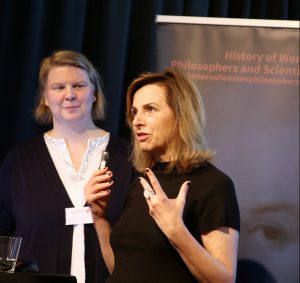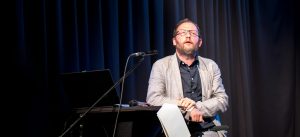
Group picture: lecturers, participants and staff of the first Libori Summer School (by Silke Corall)
Supported by the numerous photos and videos taken by members of her team, Prof. Ruth Hagengruber recapped a Summer School full of philosophical insights, enthusiasm and entertaining events. Drawing the arc from lost luggages and forgetful taxi-drivers, touching great and so-so food decisions reaching conversation on different styles of classes, future cooperations and general feeling of gratitude, the Center director and the participants of the Libori Summer School agreed on calling this first Summer School a great success that will raise the bar for future events of the Center and in the research area of Women Philosophers in general.

f.l.t.r. Julia Lerius and Prof. Ruth Hagengruber (Photo by Julius Erdmann)
The second part of the evening was orchestrated by Julia Lerius, who presented the future plans of the Center, ranging from the upcoming Autumn Masterclass, the Conference on Women Phenomenologists in November, and all the plans for the big year of 2018, packed with Conferences, Summer School, Fellowships and new Networks. Afterwards, it was Prof. Hagengruber who offered a temporary farewell, to Julia Mühl, a long member both, the research area “History of Women Philosophers and Scientists”, as well as the manager of the Center since its beginnings.
After the recap of the Summer School, the scenery changed significantly, when students of Paderborn University presented staged plays on the medieval philosopher Hildegard von Bingen in the Deelenhaus. A wild mix of videos and staged scenes portrayed the personal life and the philosophy of one of the most influential figures of medieval philosophy. Between devils and angels, her Ordo virtutum taken as foundation of jurisdiction and videos applying her teachings to modern day problems, the students of Paderborn University under the direction of Prof. Gerhard Ortner managed to deliver.

Dr. Charles Wolfe, giving his talk. (Photo by Melis J. Yilmaz)
Following the play, Charles Wolfe introduced himself as the last man standing – between the participants and the buffet. Far from feeling delayed though, the participants were delighted listening to the depiction of “Margaret Cavendish and the Problem of Early Modern Vitalism”. He not only managed to illustrate the Cavendish’s unique understanding of vitalism compared to her philosophical peers, but also playfully touched the issue on whether Cavendish’s philosophy might be considered in the spectrum of feminist traditions. This delivered the material for many fruitful discussions during dinner.
The evening developed into leisure time, with a rich buffet provided by the Trattoria “Pane e Vino”, a musical playlist with women interprets only and of course wine and conversations.
The general flair of the final evening mirrored the impression that probably each of the organizers, lecturers and participants at some point expressed in private – that this is only the beginning of many great opportunities to reexplore the history of philosophy anew under a different perspective. There is still so much work to be done and ideas to discover.
(Niklas Corall)
You cannot copy content of this page








